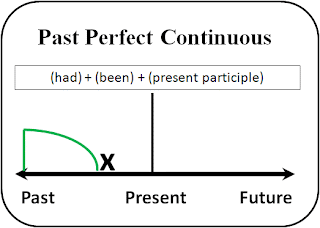12- THE PAST PERFECT CONTINUOUS TENSE
Affirmative
|
Negative
|
Interrogative
|
I had been working.
You had been sleeping. He/She/H bad been eating.
We had been waiting.
You had been dancing. They had been talking.
|
I had not
been working.
You had not been sleeping. He/She/k had not been eating.
We had not been waiting.
You had not been dancing. They had not been talking.
|
Had I been working?
Had you been sleeping?
Had he/she/it been eating?
Had we been waiting?
Had you been dancing?
Had they been talking?
|
He had been sleeping for two hours when suddenly a noise woke him up
in the middle of the night.
The two countries had been fighting for almost seven years when a peace
treaty was signed between them.
The party had been going on for two hours when the lights suddenly
went out.
When she decided to retire, she had been working as a teacher for fifteen years.
Örneklerde de görüldüğü gibi, Past Perfect Continuous Tense, tam
olarak Present Perfect Continuous Tense'in
past biçimidir. Hatırlayacağınız
gibi. Present Perfect Continuous, geçmişte başlayıp içinde bulunduğumuz anda da
devam eden , ya
da içinde bulunduğumuz anda henüz bitmiş ama belirtileri devam eden eylemleri ifade ediyordu. Past Perfect
Continuous ise, geçmişte başlayıp yine geçmişte bir noktaya kadar devam eden eylemleri ifade
eder.
We had been waiting for him for exactly three hours when he finally
came.
His hands
were covered in oil, because he had been repairing the car.
The
child's eyes were watery, because he had been crying.
They were all exhausted, because they had been working hard since
the morning.
( Hepsi çok yorgundu, çünkü
sabahtan beri çok yoğun çalışıyorlardı.)
He had
been studying English for two hours when I went to see him.
( Ben onu görmeye gittiğimde, iki saattir İngilizce çalışıyordu.)
( Ben onu görmeye gittiğimde, iki saattir İngilizce çalışıyordu.)
12-2
Past Perfect Continuous Tense ile Past Continuous Tense arasındaki ayrıma dikkat ediniz.
1) When I went home, he was studying.
(Ben eve gittiğimde o ders çalışıyordu.) (Past Cont.)
(Ben eve gittiğimde o ders çalışıyordu.) (Past Cont.)
2) When I went home, he had been studying for two
hours.
(Ben eve gittiğimde o iki saattir ders çalışıyordu.) (Past Perfect Cont.)
(Ben eve gittiğimde o iki saattir ders çalışıyordu.) (Past Perfect Cont.)
Birinci cümledeki " was studying ",
sadece "Den gittiğim anda ne yapıyordu?" sorusuna yanıt olabilir.
İkinci cümledeki " had been
studying " ise, "Ben gittiğimde yapmakta olduğu işi ne zamandır
yapıyordu?" sorusunu yanıtlar.
The other members were discussing the agenda when I got to the
meeting.
The other members had been discussing the agenda for the
last half hour when I got to the meeting.
They were staying at a hotel
near the sea when I met them in Bodrum.
They had been staying at a hotel for five days when I met them in Bodrum.
NOTE: "Since", Perfect Tense'lere özgü bir zarftır. Ancak, "for", diğer tense'lerle de kullanılır.
I'm going to Ankara for two weeks.
(Şimdiki zamanın Gelecek zaman anlamıyla kullanımı)
İki haftalığına Ankara'ya gidiyorum.
(Şimdiki zamanın Gelecek zaman anlamıyla kullanımı)
İki haftalığına Ankara'ya gidiyorum.
I have worked
for this company for seven years.
(Present Perfect) Yedi yıldır bu şirkette çalışıyorum.
I have been living here for eight years. (Present Perfect
Continuous)
Sekiz yıldır burada yaşıyorum.
Sekiz yıldır burada yaşıyorum.
When I resigned from my work, I had worked
there for ten years. (Past Perfect.)
İşimden istifa ettiğimde, on yıldır orada çalışıyordum.
İşimden istifa ettiğimde, on yıldır orada çalışıyordum.
When the guests arrived, I had been working in the
kitchen for three hours. (Past Perfect C.)
Konuklar geldiğinde, üç saattir mutfakta çalışıyordum.
Konuklar geldiğinde, üç saattir mutfakta çalışıyordum.
Last year, I stayed in İzmir for a month. (Simple Past) Geçen yıl bir ay İzmir'de kaldım.
Özellikle bağlaçlı cümlelerde "for" un bu kullanımlarına çok
dikkat ediniz. Şimdi şu iki cümle arasındaki farkı inceliydim:
1) When I graduated, I lived in İzmir for five years. (Mezun olunca beş yıl
İzmir'de oturdum.)
2) When I graduated, I had been living in İzmir for five years. (Mezun
olduğumda beş yıldır İzmir'de oturuyordum.)
When I graduated in 1986, I lived in İzmir for five years.
(First, I graduated. Then 1 lived in İzmir.)
(Mezun olduktan sonraki beş yılı ifade ediyor.)
When I graduated in 1986, I had been
living in İzmir for five years.
(First I lived in İzmir. Then I graduated.)
(Mezuniyetten önceki beş yılı ifade ediyor.)
(First I lived in İzmir. Then I graduated.)
(Mezuniyetten önceki beş yılı ifade ediyor.)

